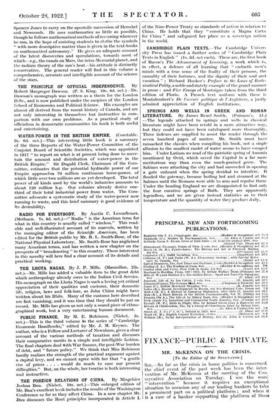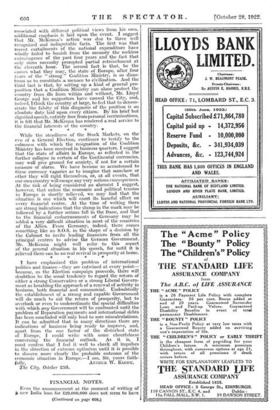FINANCE-PUBLIC & PRIVATE.
MR. McKENNA ON THE CRISIS. [To the Editor of the SPECTATOR.] SIR,—So far as the crisis in home politics is concerned, the chief event of the past week has been the inter• vention of Mr. McKenna at the meeting of the Con- servative Association on Tuesday. I use the word " intervention "• because it requires an exceptional situation to occasion any of our leading bankers to take a prominent part on a political platform ; and when it is a case of a banker supporting the platform of those associated with different political views from his own, additional emphasis is laid upon the event. I suggest that Mr. McKenna's action was due to three well recognized and indisputable facts. The first was that recent curtailments of the national expenditure have wholly failed to banish from the memory the reckless extravagance of the past four years and the fact that only stern necessity prompted partial retrenchment at the eleventh hour. The second fact is that, be the causes what they may, the state of Europe, after four years of the " strong " Coalition Ministry, is so disas- trous as to constitute a menace to civilization. And the third fact is that, by setting up a kind of general pro- position that a Coalition Ministry can alone protect the country from ills from within and without, Mr. Lloyd George and his supporters have caused the City, and, indeed, I think the country at large, to feel that to demon- strate the falsity of this diagnosis of the position is an absolute duty laid upon every citizen. By his brief but dignified speech, entirely free from personal recriminations, it is felt that Mr. McKenna has rendered a real service to the financial interests of the country.
• While the steadiness of the Stock Markets, on the eve of a General Election, continues to testify to the calmness with which the resignation of the Coalition Ministry has been received in business quarters, I suggest that the state of affairs in Europe, as reflected in the further collapse in certain of the Continental currencies, may well give ground for anxiety, if not for a certain measure of alarm. We have become so accustomed to these currency vagaries as to imagine that somehow or other they will right themselves, or, at all events, that our own country will escape any very serious consequences. At the risk of being considered an alarmist I suggest, however, that unless the economic and political tension in Europe is shortly relieved, we may find that the situation is one which will exert its baneful effect on every financial centre. At the time of writing there are strong indications that the slump in the mark may be followed by a further serious fall in the franc, and that to the fmancial embarrassments of Germany may be added a very difficult situation in most of the countries of the Allies. From Germany, indeed, there comes something like an S.O.S. in the shape of a decision by the Cabinet to invite leading financiers from all the principal centres to advise the German Government. Mr. McKenna might well refer to this aspect of the general situation in his speech, for until it is xelieved there can be no real revival in prosperity at home.
* I have emphasized this problem of international politics and finance—they are entwined at every point— because, as the Election campaign proceeds, there will doubtless be the usual tendency to regard the return of either a strong Conservative or a strong Liberal Govern- ment as heralding the approach of a renewal of activity in business, both financial and commercial. Undoubtedly the establishment of a strong and capable Government will do much to aid the return of prosperity, but to overlook or even to underestimate the special difficulties with which any- Government will be confronted until the problem of Reparation payments and international debts has been concluded will only lead to sore miscalculations. It can be admitted that in many directions there are indications of business being ready to improve, and, apart from the one factor of the disturbed state of Europe, I could write with some cheerfulness concerning the financial outlook. As it is, I must confess that I feel it well to check all impulses in the direction of extreme optimism until it is possible to discern more clearly the probable Outcome of the economic situation in Europe.—I am, Sir, yours faith-











































 Previous page
Previous page